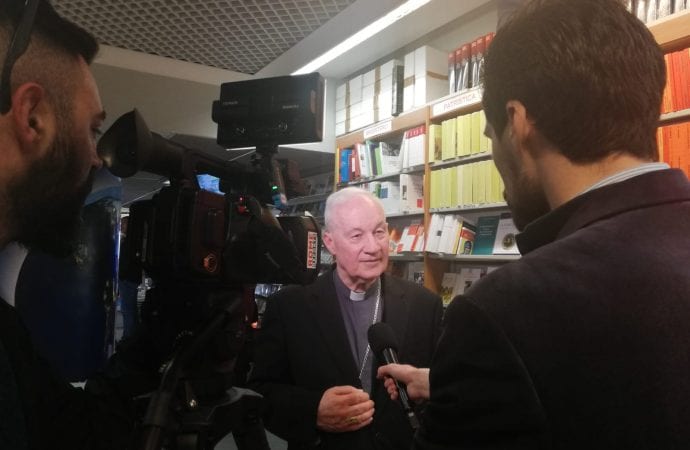As Catholics worldwide inch closer to Holy Week, a high-ranking Canadian prelate on Tuesday criticized “a transmission of the faith that’s too complicated” and reminded Catholics of the importance of communion among laity, clergy and the pope.
“Communion with the pope on the part of the bishops and of society as a whole is very important,” said Canadian Cardinal Marc Ouellet, prefect of the Vatican’s Congregation for Bishops and head of the Pontifical Commission for Latin America, speaking to local reporters.
The remarks took place at a press conference presenting Ouellet’s new book The Gift of Communion, a series of meditations for Holy Week leading up to Easter, which took place April 9 a stone’s throw from St. Peter’s Square at the Vatican.
The book is largely drawn from homilies and meditations the cardinal gave to 230 women religious of the Spanish institute Iesu Communio during Holy Week in 2017. The order, which has inspired numerous vocations in Spain, is unique “in our time where monasteries close everywhere,” the cardinal said.
During his presentation, Ouellet said that “it’s necessary to overcome a behavior that believes God is above everything,” which he describes as “supranatural metaphysics” where the divine is “not involved in human relationships.”
The cardinal said “the paschal mystery is a trinitary event that bears fruit in the Church” referring to Easter, and while the Holy Trinity may often seem “an incomprehensible theorem” it stems from something very concrete.
“We were baptized in the name of the Father and the Son and the Holy Spirit,” Ouellet said. “We were immersed in these relationships, because the three divine persons are the sign with which our being was sealed.”
The Trinity, he added, “is a reality, not a dream.”
The cardinal’s reflections on Holy Week, based on “accumulated material” from “a life of meditation of the life of Christ,” owe a lot to the works and thought of Swiss theologian Hans Urs von Balthasar, whom Ouellet credits with showing him “the mystery of Christ in a new way.”
The book “is an itinerary of prayer and meditation for Holy Week, not just by remembering the events of the passion and resurrection of Christ, but especially by following his interior passion, meaning that which went through his heart,” the cardinal said.
Italian journalist Andrea Tornielli, editorial director for the Vatican’s Dicastery for Communication, provided a brief summary of highlights of the 272-page book. In today’s secular context, Tornielli said, the book is a reminder of the “urgency that any catechesis take place after the announcement of God as love, and of a God that embraces you.”
In a section regarding Judas’s betrayal of Jesus, Ouellet notes Christ was never angered and accepts his fate. St. Peter’s blindness at that moment, he said, and Peter’s own betrayal, contain a message on the nature of evil.
“In this passage of the Gospel, Peter’s behavior should help us understand that we are all accomplices of evil and that Satan can enter within us to suggest and inspire thoughts of division and pride, which in a very subtle and almost unaware way make us into an enemy of the Lord,” Ouellet writes.
It’s grace, the cardinal said, that provides hope for humanity, which he compares to mountain climbers left with no form of salvation other than the rope that leads them upward.
Ouellet draws from the story of the prodigal son to explain the envy that grace can sometimes create.
“Spiritual envy is, certainly, the poison of many of our Christian communities and the root of a sort of self-destruction of Christians: envy between lay people and clergy, between men and women, between parishes and between movements,” Ouellet wrote.
“It happens when each one of us wishes to be the favorite and not just recognized,” he added.
This is the case for the older brother of the prodigal son, who stayed home dutifully and is puzzled by the father’s mercy.
“The perfection in obedience to the law can become the biggest obstacle for us on the path toward holiness, which is obtained through mercy,” the cardinal wrote. “Holiness does not mean never falling but getting back up after every fall, with repentance and faith in the love of the Father.”
“Saints are, first of all, forgiven sinners,” he wrote.
Overcoming divisions and envy means entering a state of communion with others and with God, the cardinal told participants at the press conference.
“The discovery of faith is not an individual experience of the love of God for me, but must translate into human relationships,” Ouellet said. “If there isn’t the sacrament of the brother, of the community, faith does not grow.”

